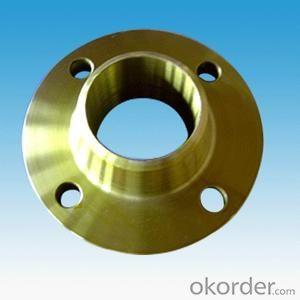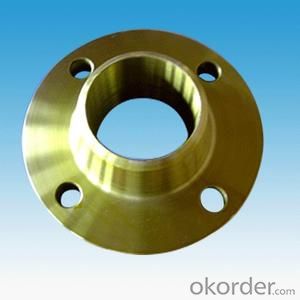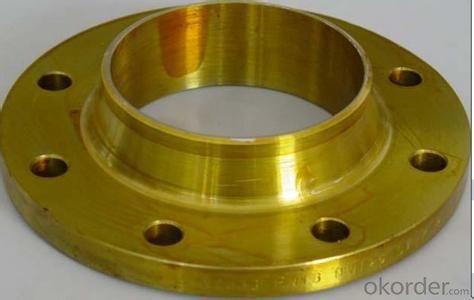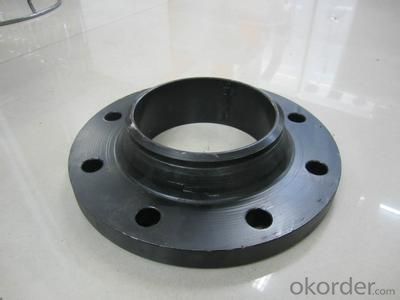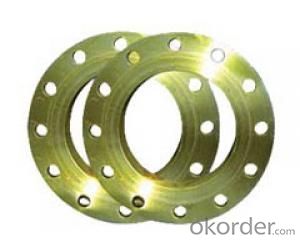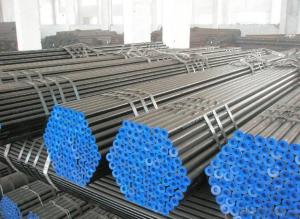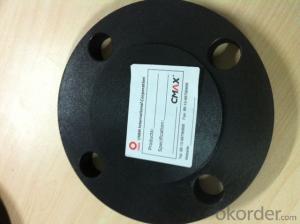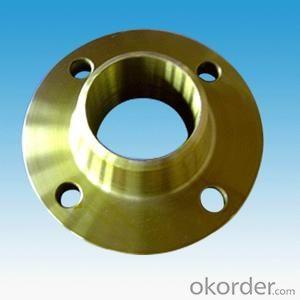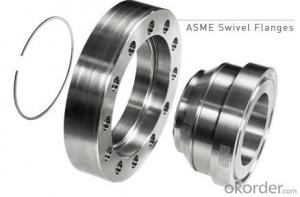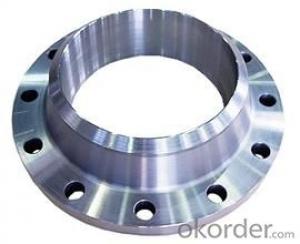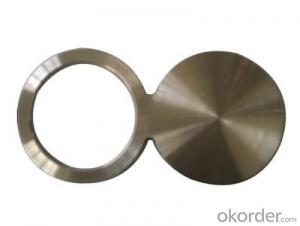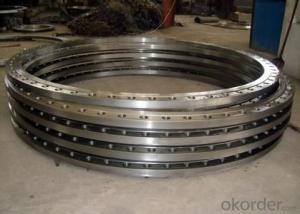CARBON STEEL PIPE FORGED FLANGES A105 ANSI B16.5 B16.47
- Loading Port:
- Tianjin
- Payment Terms:
- TT OR LC
- Min Order Qty:
- 1 pc
- Supply Capability:
- 10000 pc/month
OKorder Service Pledge
OKorder Financial Service
You Might Also Like
Package Of Carbon Steel Flange:
PACKED IN PLYWOOD CASES OR PALLETS
Painting Of Carbon Steel Flange:
BLACK OR YELLOW PAINTING FOR CARBON STEEL
Marking Of Carbon Steel Flange:
REFER TO MARKING DOCUMENT or AS PER CUSTOMER REQUEST
Shipping Marks Of Carbon Steel Flange:
EACH WOODEN BOX TWO PLASTIC SHIPPING MARKS
Specification Of Carbon Steel Flange:
Carbon Steel Flange Slip On Flange, Plate Flange, Blind Flange, Welding Neck Flange, Socket Welded Flange, Thread Flange, Lap Joint Flange, Long Welding Neck Flange
Size : 1/2"-48"
Wall Thickness.: SCH10-SCH160, SGP , XS, XXS, DIN ,STD
| Name | Carbon Steel Flange |
| Size | 1/2" - 48" |
| Face | RF, FF, RTJ |
| Wall thickness | Sch5-Sch160 XXS,STD,XS, SGP |
| Standard | ASME B16.5, B16.47, BS4504, JIS B2220, API 6A, 11Detc. |
| We can also produce according to drawing and standards provided by customers. | |
| Material | ASTM A105, A350 LF1, LF2, F11, F12, St35.8, St45.8, 15Mo3etc, |
| Packaging | Wooden Cases, wooden pallet , or carton box , or nylog bag and then in wooden cases |
| Surface Treatment | Paintting black or yellow color, or Anti-rust Oil |
| Delivery Time | 20-30 days, after received advance payment. |
| Quality | 100% Heat Treatment, No Welding repair |
| Others | 1.Special design available according to your drawing. |
| 2.anti-corrosion and high-temperature resistant with black painting | |
| 3. All the production process are made under the ISO9001:2000 strictly. | |
| 4. A conformity rate of ex-factory inspection of products. | |
| 5. we have export right , offering FOB , CNF CIF price |
STANDARD & MATERIAL GRADE
STAMDARD Of Carbon Steel Flange
| Standard | Pressure | Size | |
| European Standard | EN 1092-1 | Class PN6 ~ PN100 | DN10 ~ DN4000 |
| American Standard | ASME B16.5 | Class 150 ~ 2500 | 1/2" ~ 24" |
| ASME B16.47A | Class 150 ~ 900 | 26" ~ 60" | |
| ASME B16.47B | Class 75 ~ 900 | 26" ~ 60" | |
| German Standard | DIN 2527,2566,2573, 2576, 2627-2638,2641,2642,2655,2656 | PN6~PN100 | DN10 ~ DN4000 |
| Australian Standard | AS2129 | Table: T/A, T/D, T/E, T/F, T/H, T/J, T/K, T/R, T/S, T/T | DN15 ~ DN3000 |
| AS4087 | PN16 ~ PN35 | DN50 ~ DN1200 | |
| British Standard | BS4504 | PN2.5 ~ PN40 | DN10 ~ DN4000 |
| BS10 | T/A, T/D, T/E, T/F, T/H | 1/2" ~ 48" | |
| Japanese Standard | JIS B2220 | 5K ~ 30K | DN10 ~ DN1500 |
| API Standard | API 6A, 11D | 2000 PSI ~ 20000 PSI | 1 13/16" ~ 30" |
| French Standard | NFE 29203 | PN2.5 ~ PN420 | DN10 ~ DN600 |
MATERIAL Of Carbon Steel Flange
| Carbon Steel | ||
| Material Standard | Material Grade | |
| ASTM | ASTM A105 | A105, A105N |
| ASTM A350 | A350 LF1, LF2 | |
| ASTM A182 | F11, F12, F22 | |
| ASTM A106 | A, B, C | |
| DIN EN | DIN17175 | St35.8, St45.8, 15Mo3 |
| EN10216-2 | 195GH,P235GH, P265GH, 20MnNb6 | |
| JIS | JIS G3461 | STB340,410,510 |
| JIS G3462 | STBA12, 13, 20, 22, 23, 24 | |
| JIS G3454,G3455,G3456 | STPG 370, STB410, STS370,410, 510 | |
| STPT 370, 410, 480 | ||
- Q: Can steel pipes be used for conveying chemicals?
- Yes, steel pipes can be used for conveying chemicals. Steel pipes are known for their high strength and durability, making them suitable for transporting various chemicals. Additionally, they are resistant to corrosion, which is crucial when dealing with corrosive substances. However, it is important to consider the specific type of chemical being transported and ensure that the steel pipes are compatible with it to avoid any chemical reactions or damage to the pipes.
- Q: What is the minimum temperature that steel pipes can handle?
- The minimum temperature that steel pipes can handle depends on the specific grade and composition of the steel. Generally, steel pipes can handle extremely low temperatures without experiencing any significant issues. In fact, many types of steel are specifically designed to withstand extremely cold temperatures, making them suitable for various applications in industries such as oil and gas, construction, and cryogenics. However, it is important to note that at extremely low temperatures, steel may become more brittle, which can affect its mechanical properties. Therefore, it is essential to carefully select the appropriate grade of steel and consider any specific requirements or limitations for the intended application when determining the minimum temperature that steel pipes can handle.
- Q: Can steel pipes be used for water distribution networks?
- Yes, steel pipes can be used for water distribution networks. Steel pipes are commonly used for water distribution due to their durability, strength, and resistance to corrosion. They can efficiently handle high water pressure and are suitable for both underground and above-ground installations. However, proper protective coatings are necessary to prevent rusting and maintain water quality.
- Q: Can steel pipes be used for shipbuilding?
- Yes, steel pipes can be used for shipbuilding. Steel pipes are commonly used in shipbuilding due to their high strength, durability, and resistance to corrosion. They are utilized for various purposes such as structural components, piping systems, and ventilation systems in ships.
- Q: What are the different manufacturing standards for steel pipes?
- There are several manufacturing standards for steel pipes that are widely recognized and implemented in the industry. These standards ensure that the steel pipes are produced to meet specific requirements and quality standards. Some of the most common manufacturing standards for steel pipes include: 1. American Society for Testing and Materials (ASTM): ASTM standards are widely used in the United States and cover a wide range of steel pipe specifications. These standards include specifications for seamless and welded steel pipes, as well as various grades and dimensions. 2. International Organization for Standardization (ISO): ISO standards are globally recognized and provide guidelines for the production of steel pipes. ISO standards cover areas such as dimensions, materials, testing, and quality control. 3. European Norm (EN): EN standards are applicable in Europe and provide specifications for various types of steel pipes. These standards cover aspects such as dimensions, materials, manufacturing processes, and testing. 4. Japanese Industrial Standards (JIS): JIS standards are widely used in Japan and have gained international recognition. These standards cover dimensions, materials, and testing methods for steel pipes. 5. British Standards (BS): BS standards are commonly used in the United Kingdom and cover a range of steel pipe specifications. These standards include requirements for dimensions, materials, and testing procedures. 6. American Petroleum Institute (API): API standards are specifically developed for the oil and gas industry and cover various aspects of steel pipe manufacturing. These standards include specifications for seamless and welded pipes used in oil and gas exploration, production, and transportation. It is important for manufacturers, buyers, and users of steel pipes to be aware of these standards to ensure the quality, compatibility, and reliability of the pipes. Compliance with these standards helps to ensure that the steel pipes meet the necessary requirements and are suitable for their intended applications.
- Q: What are the common methods for joining steel pipes?
- There are several common methods for joining steel pipes, depending on the specific application and requirements. Some of the most commonly used methods include: 1. Welding: This is one of the most common methods of joining steel pipes. It involves heating the ends of the pipes and applying pressure to fuse them together. Welding can be done using various techniques such as arc welding, MIG welding, TIG welding, or even laser welding. 2. Threaded connections: In this method, the ends of the steel pipes are threaded to create a male and female connection. These threaded ends are then screwed together using pipe threads. Threaded connections are commonly used for smaller diameter pipes and in low-pressure applications. 3. Flanged connections: Flanges are used to join steel pipes in applications that require easy assembly and disassembly or when frequent maintenance is needed. Flanges are flat, circular discs with bolt holes that allow the pipes to be bolted together. The flanges provide a strong and leak-proof connection. 4. Compression fittings: Compression fittings are used to join steel pipes without the need for welding or threading. They consist of a compression nut, a compression ring, and a compression sleeve. The nut is tightened onto the sleeve, compressing it against the pipe, creating a secure connection. 5. Grooved couplings: Grooved couplings are used to join steel pipes by creating a mechanical connection. The pipe ends are grooved, and a gasket is placed between the grooves. The couplings are then tightened, compressing the gasket and creating a tight seal. 6. Soldering or brazing: These methods involve using a filler metal that has a lower melting point than the steel pipes. The filler metal is heated and melted, allowing it to flow between the pipe joints, creating a bond. Soldering is typically used for smaller diameter pipes and low-pressure applications. Each joining method has its advantages and limitations, and the choice of method depends on factors such as the pipe diameter, the application, the working pressure, and the required durability of the joint. It is important to consider these factors and consult industry standards and guidelines when selecting the appropriate method for joining steel pipes.
- Q: Where is the difference between seamless steel pipe and welded pipe?
- Seamless pipe pressure is higher, welded pipe is generally in 10 or so MPa, now welded pipe to do seamless processing.
- Q: How are steel pipes protected against ultraviolet radiation?
- Steel pipes are typically protected against ultraviolet radiation by applying a layer of protective coating or paint. This coating acts as a barrier, preventing the harmful effects of UV rays from deteriorating the steel and reducing its lifespan.
- Q: What are the common methods for inspecting the condition of steel pipes?
- Some common methods for inspecting the condition of steel pipes include visual inspection, ultrasonic testing, magnetic particle inspection, dye penetrant inspection, and radiographic testing.
Send your message to us
CARBON STEEL PIPE FORGED FLANGES A105 ANSI B16.5 B16.47
- Loading Port:
- Tianjin
- Payment Terms:
- TT OR LC
- Min Order Qty:
- 1 pc
- Supply Capability:
- 10000 pc/month
OKorder Service Pledge
OKorder Financial Service
Similar products
Hot products
Hot Searches
Related keywords
